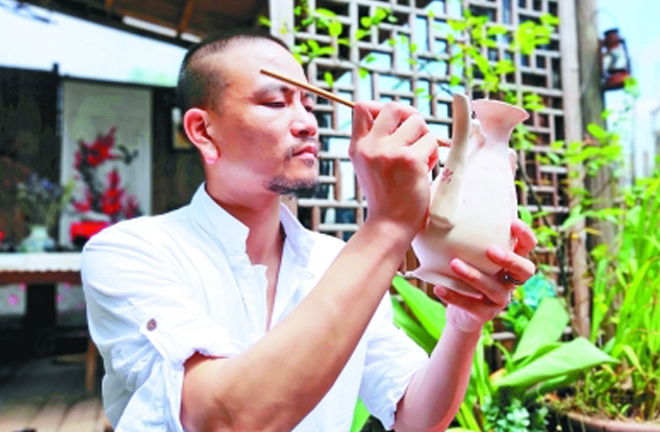Exploring high-quality development of cultural trade

A handicraftsman is making delicate teaware that will be sold to consumers in such countries as Italy, Russia and the UK. Photo: GUANGMING DAILY
In recent years, an international cultural trade in China has been emerging, the trade structure has been continuously improving and the cultural trade market has been growing. The high-quality development of cultural trade is of critical importance to China’s participation in international cultural cooperation and competition at a higher level and in more areas, to pushing Chinese culture to go global, and to enhancing China’s cultural soft power. Recently, scholars expressed their opinions on this issue.
Chen Shaofeng, deputy director of the Cultural Industry Research Institute at Peking University, said that, currently, cultural product trade still occupies a significant proportion of exports while cultural service trade accounts for a small share. Over recent years, such cultural industries as broadcast television and gaming have developed with a strong momentum, but considering their low proportion of exports, the trade structure still needs to be improved. Meanwhile, we need to create a series of cultural brands with international influence and competitiveness.
Luo Libin, deputy dean of the School of Economics at Beijing International Studies University, said that the emergence of the internet has raised the proportion of China’s cultural industry in the global cultural market, as the culture and entertainment industry in China is more digitalized than those in European and American countries. Thus, the international internet platforms facing the global market cannot ignore the Chinese market and Chinese audiences’ cultural preferences. At the same time, the huge domestic market has provided a more beneficial foundation for China to leverage its local market effect. It is more possible for Chinese cultural products to form international competitiveness in the course of catering to its domestic market. For instance, the appearance of private video websites has enhanced the opening up and international competitiveness of Chinese TV shows. Entering the internet and digital age has enabled more cultural products to benefit from economies of scale. In the course of cultivating cultural products’ international competitiveness, we can leverage the huge spillover advantage of the domestic market in more areas.
Wu Chengzhong, a professor from the School of Public Administration at the University of International Business and Economics, said that foreign investment in culture is of key importance for Chinese culture to go global. We should keep conducting cultural exchanges and further promote international cultural trade. We should improve the competitiveness of the Chinese cultural industry by managing resources at home and abroad, talent and capital, domestic and foreign cultural enterprises, and domestic and global markets. An institutional system should be established through formulating systematic policies on culture’s going global. Meanwhile, through the integration of the development of cultural trade with the promotion of the reform of cultural institution mechanisms, we should build a modern cultural industry system and market system, so as to provide effective support for invigorating Chinese cultural enterprises and strengthening the international competitiveness of cultural products and services.
edited by SU XUAN

 PRINT
PRINT CLOSE
CLOSE